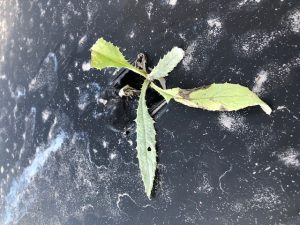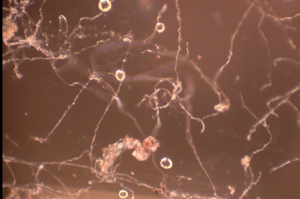Pythium is an oomycete pathogen that can infect artichokes.

Globe artichokes (Cynara scolymus) are not currently a commonly grown crop in Florida. California represents 99% of globe artichoke production in the United States. However, Florida has an opportunity to make a dent in that market. Artichokes have a moderate salt tolerance, which is important for production in coastal areas such as St. Johns County, FL. The globe artichoke is a thistle plant in the Asteraceae family. In Florida, the crop is treated as an annual, and typically planted in the early fall as seedlings. At maturity, the plant can easily grow to be 4 feet tall and wide.

In Hastings, FL at the UF/IFAS HAEC, we have completed three years of variety trials on artichokes. Now, we are addressing plant nutrition and pest management for Florida production. One reoccurring issue has been the presence of Pythium root rot (an oomycete pathogen) on young transplants. Pythium blight is more prevalent during warm, humid weather. In seedlings and transplants, a watery rot develops near the hypocotyl at or near the soil line. Plants eventually collapse and die if not treated quickly. Roots and leaves can develop lesions, along with defoliation, especially of the older leaves.

The use of black plasticulture increases the soil temperature of these plants. While we need the warmth in the winter time, the heat can be an ideal environment when planting in a warm fall season. Pythium is more likely when temperatures are in the high 80s or warmer in globe artichokes. Consider delaying planting until mid-November in NE Florida when temperatures are more mild. Also, use proper sanitation when growing seedlings or moving from a greenhouse to the field. Saturated soils will also increase the chances of this pathogen being a problem.
When Pythium is confirmed, Presidio and Ridomil Gold SL are both labeled for controlling Pythium in globe artichokes.
 0
0
